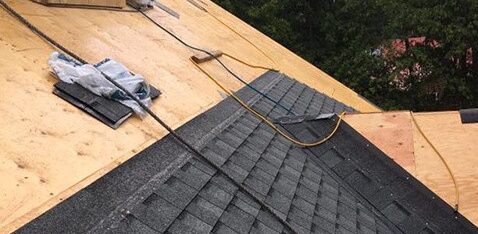
Roofs are materials designed to absorb the outcome of extreme weather conditions. Although they're produced for harsh conditions, their daily exposure to snow, rain, and sun will affect the roof's quality after some time. As a result of the degradation, there'll be penetrations and small leakages that'll allow moisture into the house, causing expensive damage.
If you've been asking, "what's the best roof tar for my NY roof?" You're about to go through a comprehensive list of the most durable types of roof tars and their unique features. Let's get the ball rolling!
A roof tar is a long-lasting waterproof and versatile covering that offers protection from sunlight, water, rain, and UV rays. It is a dark oily mixture made from petroleum byproducts and coal tar and applied on flat roofs to fix the leakage. However, the roofing tar to be used depends on the weather conditions, roof age, local roofing contractors, and the building size.
The tar used in roofs is black or deep brown residue from the coal production process or the destructive distillation of roots and trees. They are used to produce a waterproof covering for boats, ships, and roofs. Most importantly, they must be processed and refined to meet standard roofing requirements. Also, they are among the most widely used roofing materials.
In addition, some manufacturers have created tars in lighter colors like white and silver. Interestingly, some roof tars can be painted when dry to correspond with the roof's original color. Lastly, they can be removed with a tar remover, even though they may likely damage the roofing surface.
Below are some of the roof tars used in roofing:
This roof tar is used to bond, repair, or seal damaged or deteriorating areas on the roof. This tar is asbestos-free but contains surface adherents, mineral fillers, plastics, and solvents. Unlike other roof tars applied like caulk or paint, the coal tar roof cement is applied using a trowel.
The coal tar pitch is a special type of tar formed by exposing coal tar to heat treatment. It's dark brown and has a melting point of 150° Fahrenheit. Roofing systems that use this tar type are resistant to oxidation, chemical attack, and water. If properly maintained, it lasts for 30 to 40 years.
Other maintenance and preventive measures that help extend the lifespan of this roof tar include - roof audits (bi-annual roof inspection to check for damage and gauge the weather), record keeping (installation date, roofing profile data, details on previous roof repair, and more), comparison of material compatibility in case there'll be a need for roof repair, and choosing an experienced contractor for consultation on roof repair.
Most roll roofing, shingles, and built-in roofing are constructed using asphalt roofing tar. Roll roofing systems are either mineral-surfaced, smooth-surfaced, or saturated.
They are mostly used in residential building projects, while built-in roofing is used in industrial, commercial, and institutional roofing structures. Shingles asphalt are always laminated, interlocked, or stripped.
This roof tar is otherwise called type III tar and is the residue gotten from petroleum distillation. It is mostly applied on the protective membrane of roofing structures and is used on steep slopes roofs. The temperature at which the type III tar reaches optimal thickness is higher than other roof tar types.
More so, the refining process of this tar takes longer than the coal tar pitch. However, the coal tar bitumen is less durable and easily affected by weather conditions than the coal tar pitch. Due to these huge disadvantages, the roofing structures that use coal tar bitumen are limited to hot climatic conditions and steeper slopes.
In conclusion, fixing roof problems seems to be one of the most difficult DIY tasks for homeowners. Besides, using the wrong roof tar or roofing products will only cause more mayhem. You don't have to be a jack of all trades; rather, look for more skillful hands.
Plus, we've taken time to extensively answer the question: "what's the best roof tar for my NY roof?". There are many good options. All you need to do is speak with a professional roofing expert to find the most suitable roof tar for your roof. Feel free to contact us at Downtown Brooklyn Roofing 183 Bridge St Brooklyn, NY 11201 (718) 690- 9422 https://downtownbrooklynroofing.com/ for the best roof advice.
